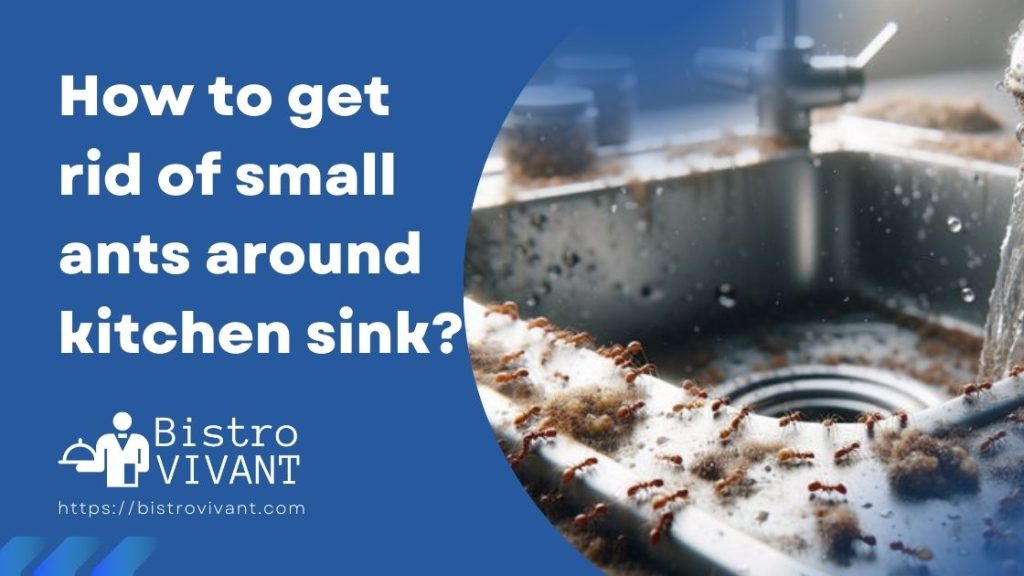Ant infestations can be a nuisance, especially when they invade your kitchen and swarm around your sink. Not only are they unsightly, but they can also contaminate your food and spread bacteria. It’s crucial to tackle the problem before it escalates. In this blog post, we will discuss effective methods for getting rid of small ants around your kitchen sink and keeping your kitchen clean and hygienic.
Key Takeaways:
- Seal Entrance Points: Identify and seal any cracks or openings in and around the kitchen sink area to prevent ants from entering.
- Maintain Cleanliness: Keep the kitchen sink area and surrounding counters clean; wipe up spills promptly; and store food in airtight containers to remove ant attractants.
- Use Ant Baits or Natural Remedies: Place ant baits or try natural remedies such as vinegar or lemon juice to deter and eliminate small ants around the kitchen sink.
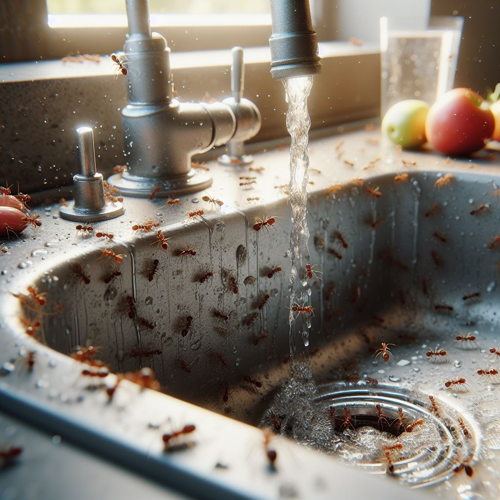
Identifying the Type of Ants
Any homeowner dealing with an ant infestation in the kitchen knows the importance of identifying the type of ant causing the issue. By understanding the specific species of ants, you can effectively target their habits, preferences, and vulnerabilities.
Characteristics of Common Kitchen Ants
The most common types of ants found in kitchen areas include odorous house ants, pavement ants, and pharaoh ants. Odorous house ants are attracted to sweets and moisture, often leaving behind a foul smell when crushed. Pavement ants, on the other hand, are known for nesting under concrete slabs and foraging for greasy and high-protein foods. Pharaoh ants are tiny and pale yellow, and they are notorious for being difficult to eradicate due to their ability to establish multiple colonies.
The Importance of Accurate Identification in Effective Elimination
Common kitchen ants may seem harmless at first, but their presence can lead to food contamination, structural damage, and potential health risks. Accurate identification of the ant species is crucial in creating a targeted elimination plan that addresses their specific behaviors and preferences. Using the wrong treatment methods can result in ineffective control and even exacerbate the infestation.
Accurate identification allows homeowners to select the most appropriate baits or insecticides and implement preventative measures to avoid future infestations. It also provides insight into the ant colonies’ locations, helping to eradicate the problem at its source.
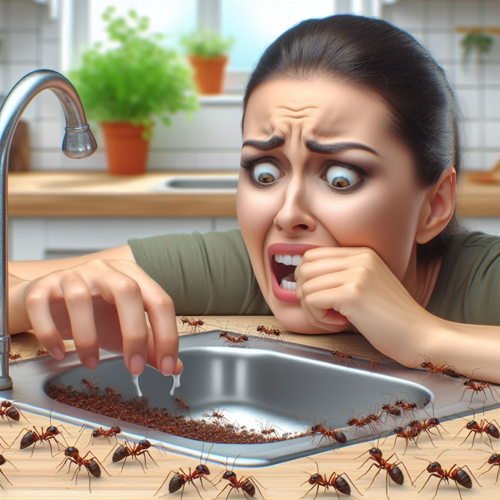
Preventative Measures
Clearly, the easiest way to control little ants around the kitchen sink is to keep them out. A few simple steps can reduce the likelihood of ants entering your kitchen and causing problems.
Keeping the Kitchen Clean and Dry
Measures to keep the kitchen clean and dry are essential in deterring ants from invading your space. Wipe down countertops, tables, and other surfaces regularly to remove any food crumbs or spills that can attract ants. Store food items such as cereals, grains, and sweets in airtight containers to prevent ants from accessing them. Additionally, promptly fix any leaks and keep sinks and drains clean and dry to eliminate potential water sources for the ants.
Implementing these measures will significantly reduce the likelihood of ants infesting the kitchen, making it a less inviting environment for them to thrive.
Do you need a kitchen cleaner? Choose one from the offer below
Sealing Entry Points and Eliminating Food Sources
Measures to seal entry points and eliminate food sources are crucial in preventing ants from infiltrating your kitchen. Inspect and seal any cracks or crevices where ants may gain entry into your home. Ensure that doors and windows are properly sealed, and consider using caulking to seal any gaps or cracks. In order to eliminate food sources, clean up food and drink spills quickly and avoid leaving food out, especially overnight.
Sealing entry points and limiting food sources can drastically reduce ant access to your kitchen and living space.
How-to Tips for Getting Rid of Small Ants
Your kitchen sink should be a place for clean dishes, not a buffet for small ants. Here are some tips to help you get rid of small ants once and for all:
- Keep your kitchen sink and countertops clean and dry to eliminate food sources and water for the ants.
- Seal any cracks or crevices in your kitchen to prevent ants from entering.
- Use natural remedies like peppermint oil or borax to deter ants from coming near your kitchen sink.
- Consider using chemical solutions as a last resort to eliminate small ant infestations.
Any infestation of small ants in your kitchen can be managed with the right approach and diligence.
Natural Remedies and Their Application
The use of natural remedies can be an effective way to repel small ants from your kitchen sink. Peppermint oil can be diluted with water and sprayed around the sink area to discourage ants. Similarly, a mixture of borax and sugar can be used to lure ants and then eliminate them.
Chemical Solutions and Safety Considerations
Oils such as lemongrass oil or tea tree oil can be used as natural insecticides to kill small ants without causing harm to humans. It is important to follow safety precautions when using chemical solutions to get rid of small ants around your kitchen sink.
It is essential to use chemical solutions carefully and keep them away from children and pets. Always read and follow the instructions on the pesticides to ensure safety and effective elimination of the ants.
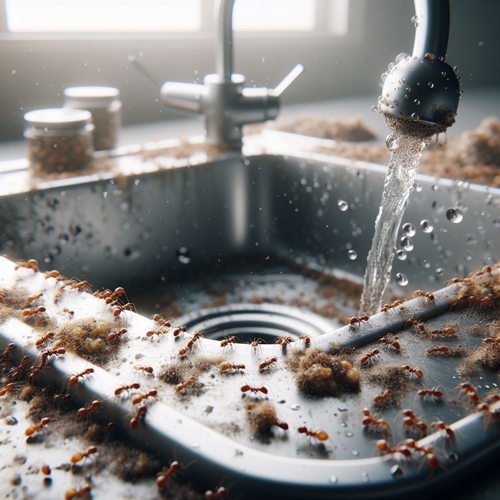
Our suggested pesticides for small ants
Maintenance and Monitoring
Now that you have taken the necessary steps to eliminate ants from your kitchen sink area, it is important to maintain a clean and ant-free environment. Implementing regular maintenance and monitoring practices will help prevent future infestations and ensure the effectiveness of your efforts.
Daily Routines to Prevent Ants From Returning
Maintain daily cleaning and hygiene to keep little ants out of your kitchen sink. This involves swiftly cleaning up food and drink spills, wiping surfaces, and storing food in airtight containers. Regularly monitoring the sink and cabinets for ant activity will help you spot and resolve concerns before they get worse.
When to Seek Professional Help
Professional assistance may be necessary if the ant infestation persists despite your efforts to eliminate it. If the ants continue to reappear or if you notice an expansion of the infestation to other areas of your home, it is advisable to seek the help of a professional pest control service. They have the expertise and resources to effectively eradicate the ant problem and provide you with long-term solutions to prevent future infestations.
A professional should handle any persistent or significant ant issue to guarantee the complete eradication of the infestation and the protection of your home from potential harm.
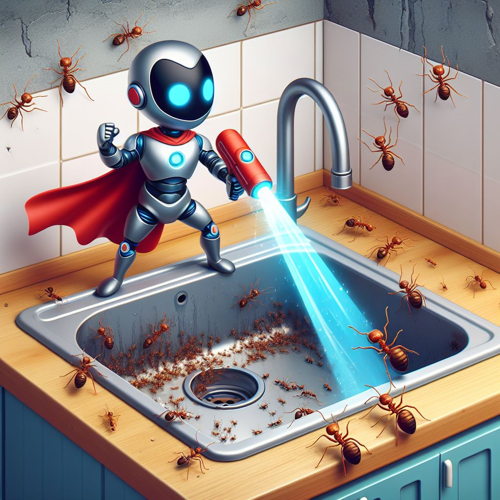
Final Words
Presently, you have learned various methods to get rid of small ants around the kitchen sink. Keep the area clean and dry, seal entry points, use natural repellents, and deploy ant traps to eradicate ants. It is important to be consistent and thorough in your efforts to prevent future infestations.
Remember that chemical solutions should be used with caution and in accordance with the product instructions. By implementing these strategies, you can maintain a clean and ant-free kitchen environment.
FAQ
Q1: How do I get rid of small ants around my kitchen sink?
Ans: The first step is to identify the source of the infestation. Keep your kitchen clean and dry, and seal any cracks or entry points. Use ant baits or natural repellents to eliminate the ants. If the problem persists, consider contacting a professional pest control service.
Q2: What are some natural remedies to repel small ants?
Ans: You can use items like vinegar, lemon juice, cinnamon, or essential oils such as peppermint or tea tree oil. These natural remedies can help deter ants from entering your kitchen and discourage them from foraging for food.
Q3: Why are there ants in my kitchen sink?
Ans: Ants are attracted to food and moisture, so a wet, dirty sink with food residue can be a prime target for them. They may also be seeking out water sources. It’s important to keep your kitchen sink clean, dry, and free of food crumbs to prevent ant infestations.
Q4: How can I prevent small ants from returning to my kitchen sink?
Ans: Regularly clean your kitchen, particularly the sink area, to remove any food particles and spills. Keep surfaces dry, and fix any plumbing leaks promptly. Seal cracks and crevices around the sink and countertops to prevent ants from gaining entry.
Q5: When should I consider professional pest control for ant infestations?
Ans: If DIY solutions fail or the ant infestation is widespread and persistent, hire a pest control agency. They have the expertise and tools to effectively eradicate ant colonies and prevent future infestations.
 https://bistrovivant.com is a participant in the Amazon Services LLC Associates Program, an affiliate advertising program designed to provide a means for website owners to earn advertising fees by advertising and linking to Amazon (.com,.co.uk,.ca, etc.) and any other website that may be affiliated with the Amazon Service LLC Associates Program. As an Amazon Associate, I earn from qualifying purchases.
https://bistrovivant.com is a participant in the Amazon Services LLC Associates Program, an affiliate advertising program designed to provide a means for website owners to earn advertising fees by advertising and linking to Amazon (.com,.co.uk,.ca, etc.) and any other website that may be affiliated with the Amazon Service LLC Associates Program. As an Amazon Associate, I earn from qualifying purchases.

